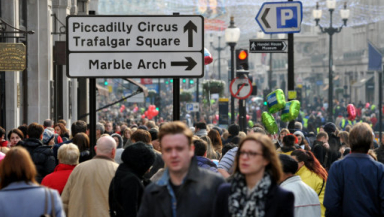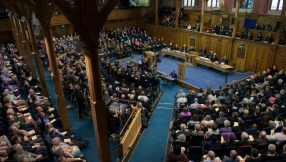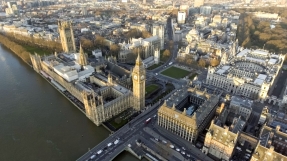
Although most people, including leading politicians like David Cameron and Eric Pickles, might want the UK to be known as a Christian country, opinion on the subject is closely divided in the population at large.
In Win/Gallup International's poll of 1,034 Britons, 35 per cent said they felt religion had a positive impact on the country, while 29 per cent took the opposite view.
The pollsters calculated net positivity or negativity scores for countries by subtracting the percentage of those with negative views from the percentage of those positive about the influence.
Overall, Britain's net positive score about religion's influence on society was only 6 per cent, putting it low down on the table compared to the rest of the world.
Out of a total of 68,800 people surveyed across 65 countries, 59 per cent said they thought religion had a positive impact in their nations, while just under a quarter (22 per cent) said they felt the impact was negative.
The overall global positivity score was 37 per cent.
Those most positive about their own religion's impact on society were Muslims and Protestants, both of whom came out 60 per cent net positive overall. Catholics were the second most positive with 56 per cent, and Orthodox Christians were third with 47 per cent net positive.
Hindus were much less optimistic about religion impacting the community around them. Only 24 per cent of Hindus felt religion made the societies they lived in better. Jews were slightly more optimistic, with 35 per cent net positive rating.
The study revealed a correlation between attitudes to religion in public life and education, with a person's view of religion's impact on society becoming increasingly negative the more educated they were.
Those with no education were 67 per cent net positive about the impact of religion on their country. Those with only primary education were 53 per cent net positive, while those with only up to secondary education were 45 per cent net positive.
Only 30 per cent of those with Bachelor's degrees thought religion did more good than harm to society, and among those with PhDs and Master's degrees, there was only a 20 per cent net positive figure.
Reflecting on why so many in Britain are sceptical, Dr Don Horrocks, Head of Public Affairs for the Evangelical Alliance, points to a combination of factors.
"The impact of 9/11 has resulted in huge levels of suspicion and fear and all religions have tended to get lumped together and are often perceived to be engaged in power politics," he told Christian Today.
"In addition we have seen high levels of scandal particularly in the Roman Catholic Church which have further created negative pictures of religion.
"There is quite a secular pervasive view now that if we are to have religion it must be private rather than public."
The media have also played their part in shaping views, he adds.
"There is no doubt that media coverage of religion in the UK is very narrow, negative and stereotypical," he said.
Susie Leafe, director of the Reform evangelical group within the Church of England, was positive that although the net figure in Britain might be low, it remains above the Western European average.
In Western Europe, 36 per cent view religion as a positive force in society, as opposed to 32 per cent who view it as negative. This leaves Western Europe with a net positive score of 4 per cent.
Western Europe is also home to six of the nine countries where more people felt religion was a negative influence rather than a positive one, making their net scores minus.
"It is perhaps surprising that in a country as secular as the UK, more than a third of people still recognise the benefit religion has on society," said Ms Leafe.
Denmark is the most negative European country, at -36 per cent, followed by Belgium with -30 per cent, and then France and Spain with -22 per cent each.The most net negative country is Lebanon, with -43 per cent.
The most positive countries in Europe are Iceland, with a net result of 43 per cent positive, and Portugal with 39 per cent positive.
The country most positive about religion's impact was Indonesia, where 95 per cent of people believe religion is good for the country.
Among the G7 nations, the UK's overall opinion of religion is the second lowest, with only France having a lower score.
America is the G7 nation with the highest opinion of religion's impact on their country, with a 43 per cent net positive rating. Italy is the second most positive with 27 per cent supporting religion's impact and society, and both Canada and Japan have a 23 per cent net positive rating.
When examining the world by region, Africa was the region with the most positivity about religion's influence on public life, with a 65 per cent net positive result. The Americas were 54 per cent net positive, and the Middle East and North Africa were 50 per cent net positive.
Although the UK's numbers seem low and the situation appears difficult, Dr Horrocks says this is to some extent expected: "Preaching salvation and repentance and change of lifestyle is never going to be popular.
"We need to show no fear of what society thinks, rather fear what God thinks and continue to stand for the word of God whilst upholding truth with grace."













